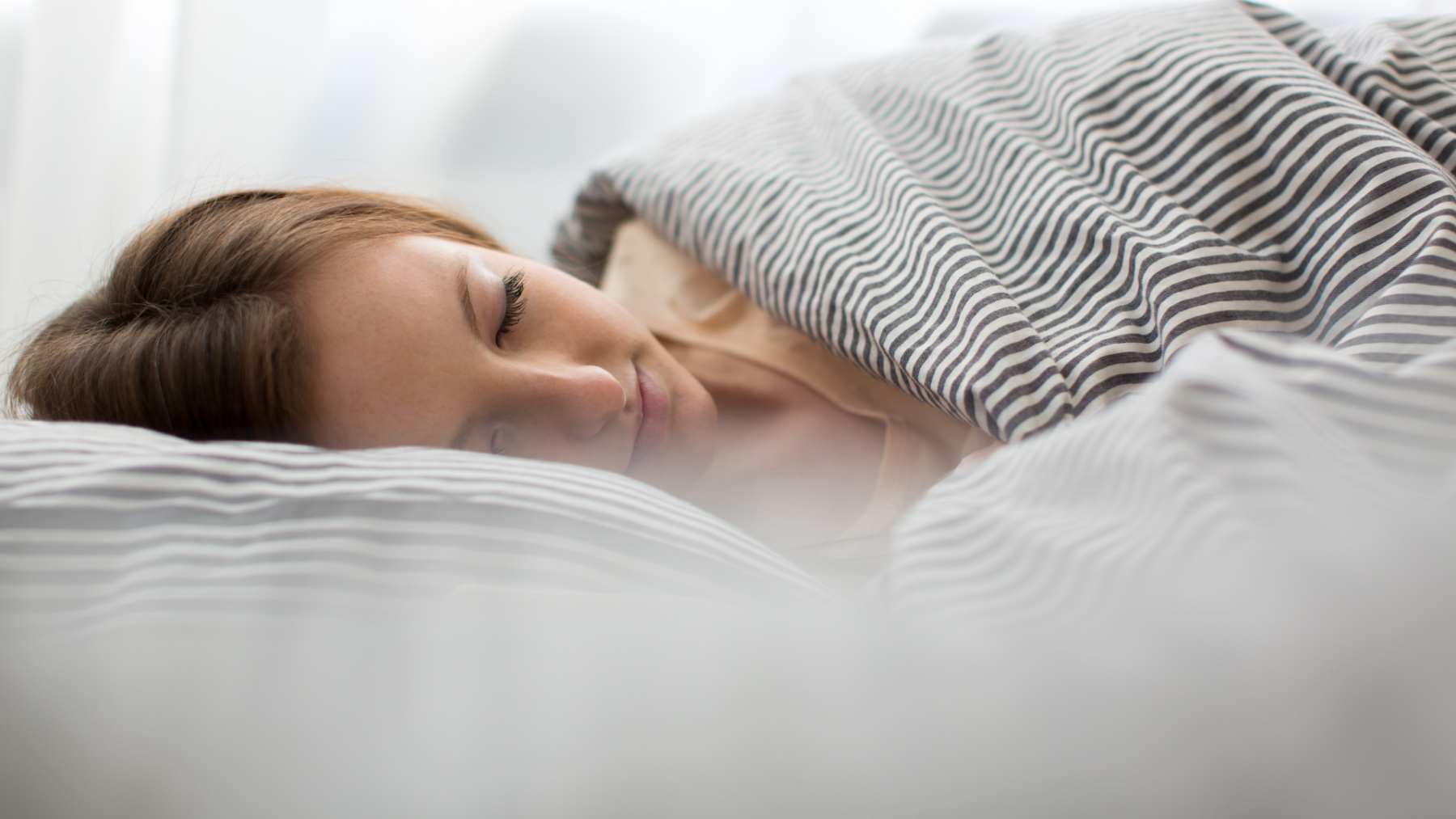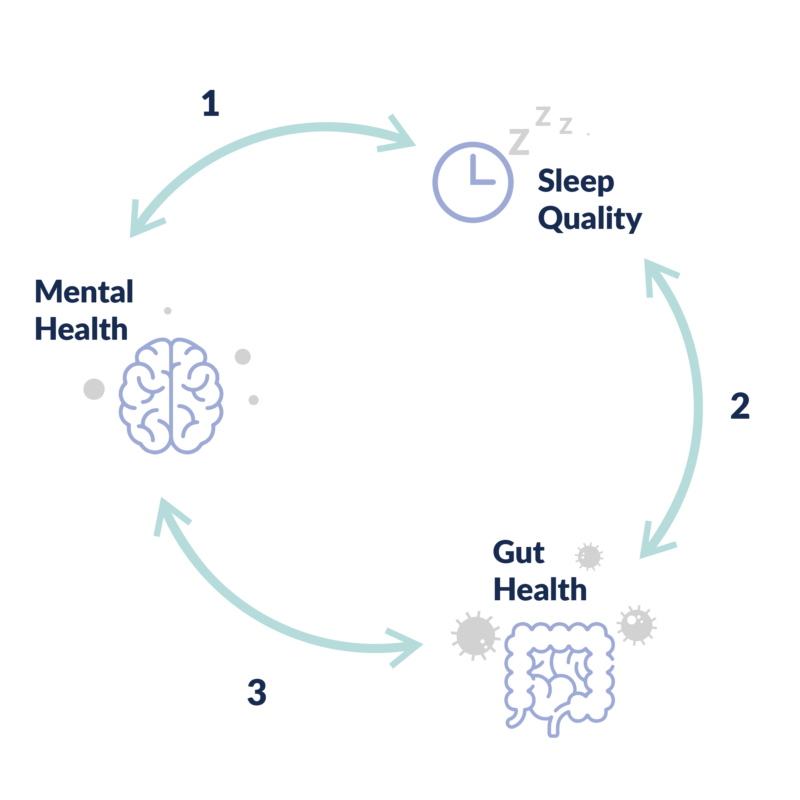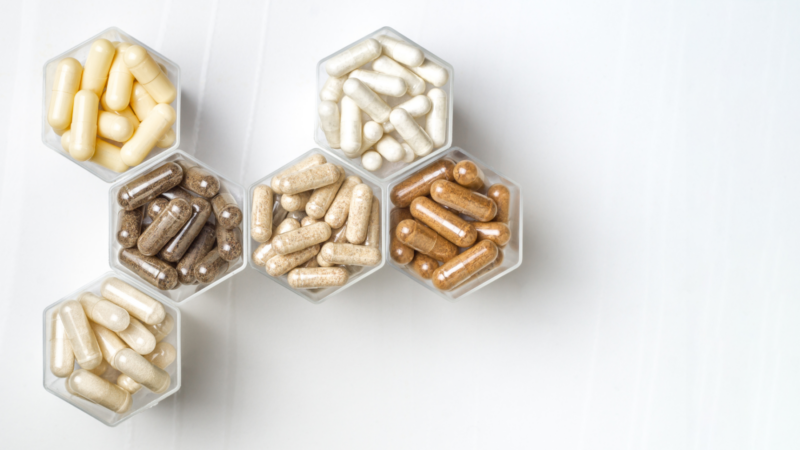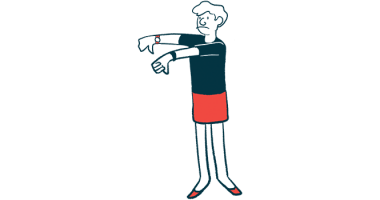Probiotic Support for Sleep and Mood

We’ve all had a bad night of sleep – anxious thoughts, uncomfortable sleeping position, needing to get up in the middle of the night – followed by a day of fogginess and irritability. But if one bad night turns into a pattern of poor sleep, it can affect you in ways that an extra cup of coffee won’t fix.
When sleep isn’t optimal, other areas of our lives are impacted too, like mental health and even gut health. As surprising as it might sound, there’s a connection between sleep, mood, and the gut microbiome. Keep reading to learn how your gut could be the key to a peaceful mind and better sleep.
How Sleep & Mood Are Connected to the Gut
The CDC estimates that about a third of US adults don’t get at least 7 hours of sleep per night on a regular basis. Without the restorative functions of the different phases of sleep, our digestive, immune, and nervous systems can take a hit.
Poor sleep can also kick off a vicious cycle of dysfunction in sleep, mental health, and gut health (see below).

Mental health and sleep (arrow #1) are intertwined. For example, a 2021 study1 showed that people with mental health issues including mood instability were more likely to wake up and stay awake longer during the night.
Gut health and sleep likewise impact one another (arrow #2). Night-time symptoms of poor gut health like abdominal discomfort and urgency may disturb sleep. On the other side of the coin, consistent trouble sleeping can lead to changes in gut microbiome composition2, abdominal discomfort, and gut dysfunction3.
There are also many studies that suggest a link between gut and mental health (arrow #3; see reference 4 below for an example). Changes in gut microbiome composition may influence levels of neurotransmitters5 like dopamine, γ-aminobutyric acid (GABA), and serotonin, which affect mood.
Using the Gut to Support the Mind
Most people don’t reflect on a bad night’s sleep or a dip in their mood and think of gut health as a solution. But there are good reasons to do so.
As we’ve seen, the gut, sleep quality and mental health can influence one another in negative ways. But the opposite is also true. New studies suggest that certain foods as well as neurologically active probiotics may be ways to use your gut to get more rest and a more positive outlook on life.
Fermented, Fibrous, & Functional Foods
For some people, supporting a healthy microbiome and getting a better night’s rest may be as simple as a trip to the grocery store. There are many foods that may help with sleep – including prebiotics, fermented foods with live cultures, and certain functional foods.
Including fermented foods such as yogurt, kefir, kimchi, and kombucha in the diet can lead to increased microbial diversity6 in the gut. In turn, higher diversity in the gut microbiome is associated with better sleep quality7.
Adding fiber-rich prebiotic foods to your plate may increase gut microbial diversity8 as well. Prebiotics are fibers that beneficial gut microbes eat. They may lower sleep disturbances9 in those with gut issues, and improve both sleep and mental health10 for those with mood issues. Examples of prebiotic foods include oats, apples, flax, chicory, inulin, and onions.
Functional foods such as whole grains, lettuce, cherries, kiwifruit, and milk contain sleep-promoting compounds11. While it’s not known exactly how they work, they may also act via the gut microbiome.

Neurologically Active Probiotics
An exciting development over the past 10 years is the emergence of psychobiotics – a special type of probiotic that when administered in adequate amounts confers a neurological health benefit. And they appear to do this not as a beneficial “side effect” of supporting gut health, but because they can actually influence the brain from the gut.
Many psychobiotics are being studied for mental health, such as stress levels, and a few have been studied for their impact on sleep12. While it’s not known precisely how they work in humans, preclinical studies suggest a few possible mechanisms13.
Psychobiotics may produce or metabolize neurologically active molecules in the gut. Some may work by affecting molecular signaling between the gut and brain in ways that influence brain dopamine and serotonin. Either of these mechanisms may support mental health and sleep.
L. plantarum PS128 (PS128) is a psychobiotic that is supported by 12 clinical studies. In an 8-week study14 of highly stressed information technology (IT) workers, participants reported improvements in levels of stress and mood.* A randomized double-blind study also showed that PS128 improved the quality of deep sleep15.* In other PS128 studies, participants noticed improved focus.*
Many people with unmet neurological and mental health needs are looking for effective options to support their health or the health of loved ones. At Bened Life, we believe that safe and effective microbiome solutions are part of the answer. Learn more about our patented PS128 strain, the active ingredient in Neuralli, on our website.
*These statements have not been evaluated by the Food and Drug Administration. This product is not intended to diagnose, treat, cure, or prevent any disease.
Cited references:
- https://bionewscentral.com/mental-illness-associated-with-poor-sleep-quality-according-to-largest-study-of-its-kind/
- https://pubmed.ncbi.nlm.nih.gov/29031742/
- https://pubmed.ncbi.nlm.nih.gov/15595333/
- https://pubmed.ncbi.nlm.nih.gov/30095672/
- https://www.ncbi.nlm.nih.gov/pmc/articles/PMC8234057/
- https://www.cell.com/cell/fulltext/S0092-8674(21)00754-6
- https://journals.plos.org/plosone/article?id=10.1371/journal.pone.0222394
- https://academic.oup.com/nutritionreviews/article/78/10/798/5811361
- https://pubmed.ncbi.nlm.nih.gov/36245486/
- https://pubmed.ncbi.nlm.nih.gov/36815026/
- https://www.ingentaconnect.com/content/ben/cst/2014/00000009/00000003/art00006
- https://www.mdpi.com/2072-6643/12/12/3896
- https://www.ncbi.nlm.nih.gov/pmc/articles/PMC5102282/
- https://www.frontiersin.org/articles/10.3389/fnut.2021.614105/full
- https://www.mdpi.com/2072-6643/13/8/2820
About the Author

Noelle Patno, Ph.D. is Chief Science Officer at Bened Life, makers of Neuralli. She started her career after a B.S. in chemical engineering with honors and distinction from Stanford in the pharmaceutical and medical device world. Since completing her PhD in Molecular Metabolism and Nutrition from the University of Chicago, Dr. Patno has focused on dietary supplements and medical foods, with clinical prebiotic and probiotic research.






